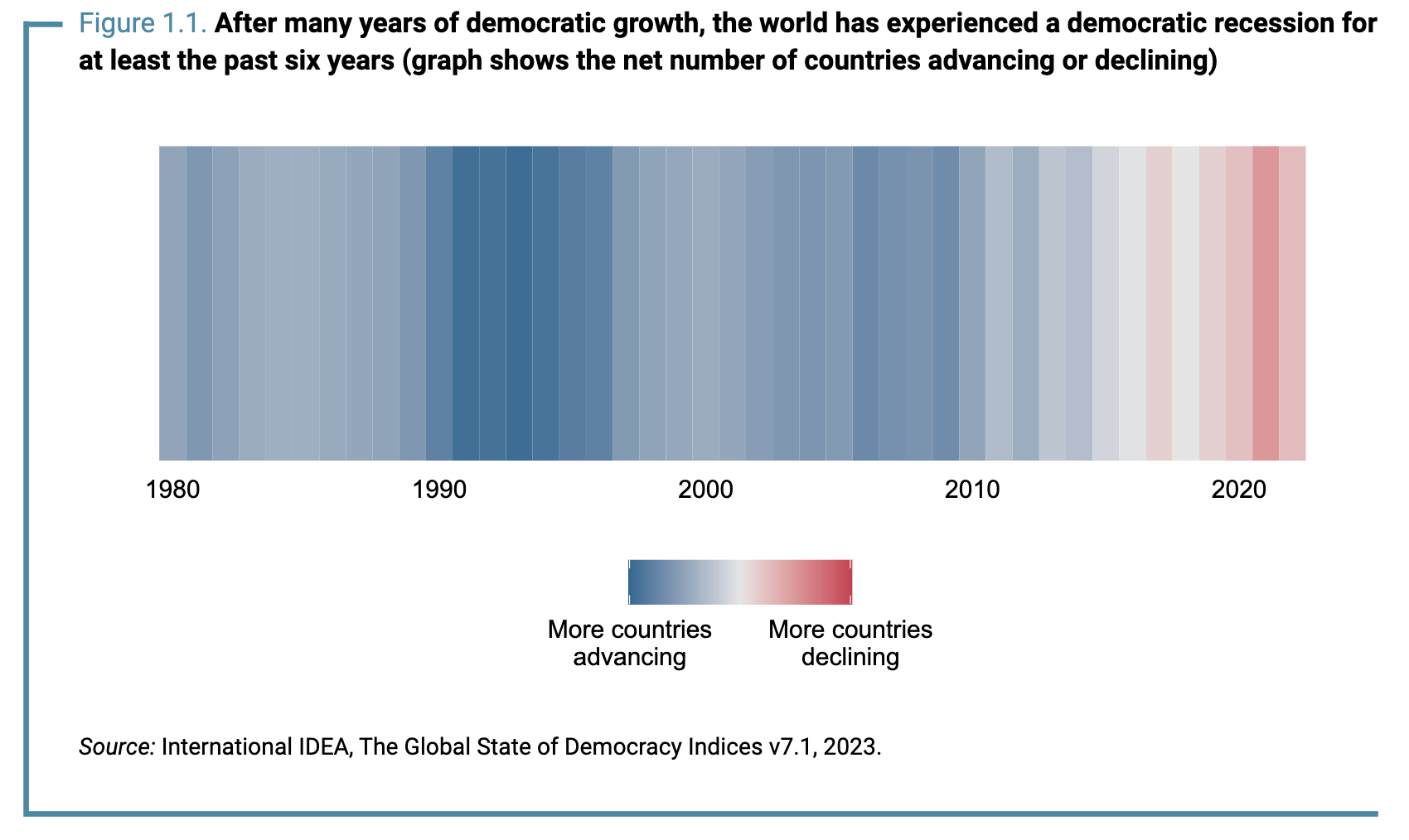Globally, nationalism is on the rise and democracy is under pressure and within decline in several countries (see graph from “The Global State of Democracy 2023. The New Checks and Balances“, p. 18, Global State of Democracy Initiative, 2023, International Institute for Democracy and Electoral Assistance, https://www.idea.int). The reasons for that are certainly manifold.
We see a (grass-roots) political vacuum on supra-national level and – at the same time – we see with global warming, climate change, and the loss of biodiversity a severe global threat. It might be hard for people to understand the complex and international correlations. We think, they feel the rising pressure, probably not yet from climate change but from international competition, international crime, international inequality.
COVID-19 pandemics (“Over 760 million cases and 6.9 million deaths have been recorded worldwide since December 2019, but the actual number is thought to be higher.“, World Health Organisation, 2023/08/09, https://www.who.int) showed significantly a (political) reflex to nationalism within a “frightening situation”.
With global warming, climate change, and the loss of biodiversity we are heading into a potentially much more severe humanitarian catastrophe than COVID-19 with (not thousands, not millions, but) billions of people losing their natural resources (e.g. water), basis of existence (e.g. food harvesting), and livelihood (e.g. viable temperatures).
The major difference between COVID-19 and global warming is the speed of change. The climate system is reacting slow and inert, and that makes it difficult for human aesthetics and thus (much) more dangerous. Slow and inert developments are difficult to explain and difficult to percept, since there is no direct attraction, no direct pain, no direct impact, no direct (health) threat. This makes it very hard for scientist and media to communicate the potential scenarios, and get awareness or consternation or even shock to actually initiate change with human behaviour and political decision making. Suppression, short term thinking based on the current perception, together with cognitive dissonance, and the mimetic forces (greed, vanity, envy, jealousy, groupthink) are strong within complex and inert systems. The consequence is a high chance for too slow and too late (political) actions. Usually this ends fatal.
2023 G20 summit and COP28 showed weak governance to actually mitigate global warming. The weak decisions moreover are done (strongly) in-transparent and are (thus) very weak democratically legitimised. Significant amounts of money (from the tax payers) are mobilised with these supra-national decisions at the same time. We think, people feel this political vacuum on supra-national level and feel helpless. The highly probable reaction within such a situation is a reflex to alleged “simple solutions” (e.g. migrants are causing the problem), and the “concept of the enemy” (e.g. refugees are the scapegoats) becomes very attractive. This increases nationalism.
Based on this, we are heading into a situation with
(1) rising global population,
(2) decreasing habitual areas on planet Earth due to global warming and the loss of biodiversity and
(3) rasing nationalism, and thus rising pressure on peace and “Human Rights”.
To get out of this – in our view – fatal development cycle, to prevent a humanitarian catastrophe with billions of people fleeing and/or dying, we first of all need to restore the trust from the people into global politics. This can be done most significantly with actual participation. (Grass-roots) Democracy means participating people with impacting decision making. Currently the most impacting decision making on global scale is done within in-transparent multilateralism.
Strong leadership means within this context the development of global and transparent (grass-roots) democracy, although this might sound utopian or paradox. In our view, actual participation and transparency with actual global (grass-roots) democracy can mitigate the rise of (local) nationalism.
Democracy means most of all one vote for one person, no matter what gender, what race, what religion, what income, what wealth. Global democracy would expand this understanding of democracy with no matter what nationality.
We think, the rise of nationalism can be significantly mitigated with the development of a strong global (grass-roots) democracy. We think, we need more – not less – global political participation, global collaboration, global solidarity, global coordination, and strong global legal, social, health, and environmental standards. This can be reached with strong and (grass-roots) democratic legitimised global institutions organised within a “Republic”, with a strong “separation of power” between the legislative, executive, and judicature system and strong, independent, and thus plural (global) media. We call this a “Global Democratic Republic”.
In our view, the best way to fight (local) nationalism is to come up with better and convincing solutions. We think, the development of a “Global Democratic Republic” can be the core of such solutions.
